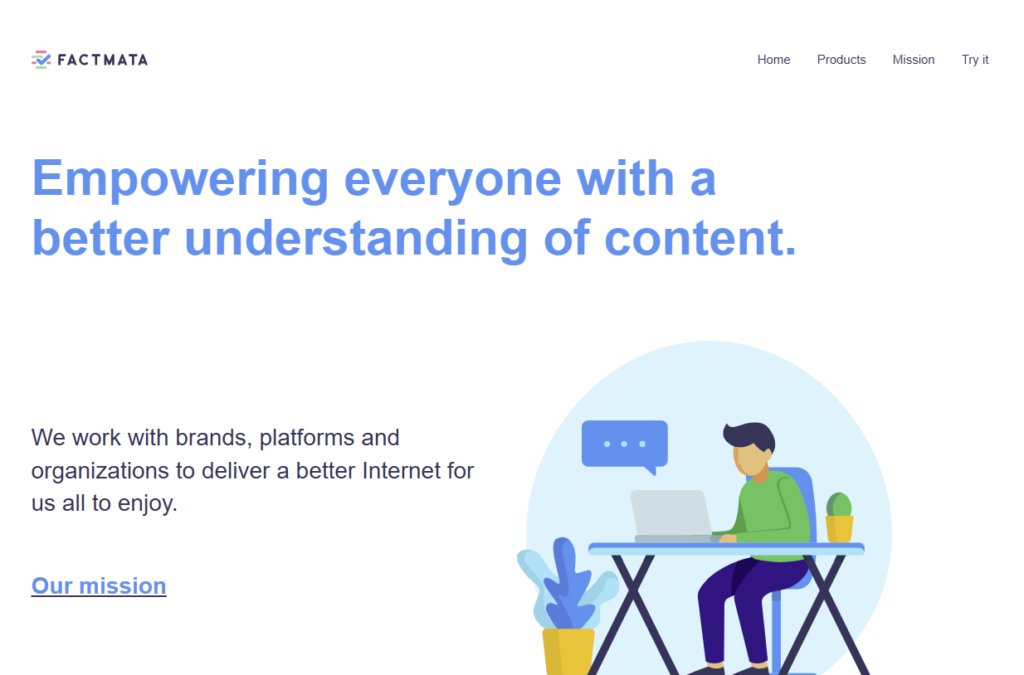Physical Address
304 North Cardinal St.
Dorchester Center, MA 02124
Physical Address
304 North Cardinal St.
Dorchester Center, MA 02124

Factmata was a London-based startup founded in 2017 with the ambitious goal of using artificial intelligence to combat misinformation and restore trust in online content. Backed by prominent investors, including Mark Cuban and Biz Stone, the company developed AI-powered tools to detect biased, misleading, and harmful content. However, despite its innovative approach, Factmata faced numerous challenges, from technical hurdles to financial sustainability, leading to its acquisition by Cision in 2022. This article explores Factmata’s vision, origins, technology, challenges, partnerships, impact on media, and its ultimate fate.

Factmata aimed to tackle the growing problem of online misinformation using AI. Unlike traditional fact-checking services that relied on human analysts, Factmata sought to develop an automated system capable of detecting misleading narratives in real-time. The company focused on labeling content across various dimensions, including bias, clickbait, hate speech, and propaganda, rather than purely determining truth or falsehood. The goal was to provide a credibility rating for online content, empowering users to make more informed decisions about the information they consumed.
Factmata was founded by Dhruv Ghulati, a former investment banker turned AI researcher, alongside Sebastian Riedel and Andreas Vlachos, both renowned experts in natural language processing (NLP). Riedel and Vlachos had previously worked on automated fact-checking at University College London (UCL) and The University of Sheffield, respectively. Another key figure was Robert Stojnic, an ex-Wikipedia developer who contributed to the platform’s search infrastructure. This diverse team of entrepreneurs and researchers positioned Factmata as a promising AI-driven solution to misinformation.
Factmata’s core innovation was its natural language processing (NLP) algorithms, which analyzed news articles and social media posts to detect patterns associated with misleading content. The company’s AI models were trained using data annotated by a network of journalists, researchers, and domain experts. Factmata developed eight key content classifiers to assess:
Rather than outright labeling content as true or false, Factmata’s system flagged content based on risk factors and credibility indicators. The company also integrated these insights into a browser extension, Trusted News, which allowed users to see real-time credibility scores on web pages.
Despite its promising technology, Factmata encountered significant challenges:
Factmata attracted high-profile investors, including:
The company also secured a partnership with Eyeo GmbH, the firm behind Adblock Plus, to develop credibility scores for online advertising. Factmata positioned itself as a tool for brands and advertisers to avoid funding misleading or harmful content.
Although Factmata did not achieve mass adoption, it contributed valuable insights to the misinformation fight. Its AI-driven approach influenced how content credibility scoring was implemented in digital advertising and media monitoring. Factmata’s research also demonstrated the importance of human-AI collaboration in misinformation detection, reinforcing that purely automated systems are insufficient.
By 2022, Factmata was struggling to sustain its operations. The key reasons for its failure as an independent entity include:
In November 2022, Factmata was acquired by Cision, a global media intelligence and PR company. Under Cision, Factmata’s technology was integrated into broader media monitoring and brand safety tools. The acquisition ensured that Factmata’s AI research would live on, but it marked the end of Factmata as a standalone startup.
Factmata’s journey offers several lessons: